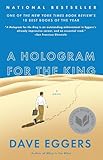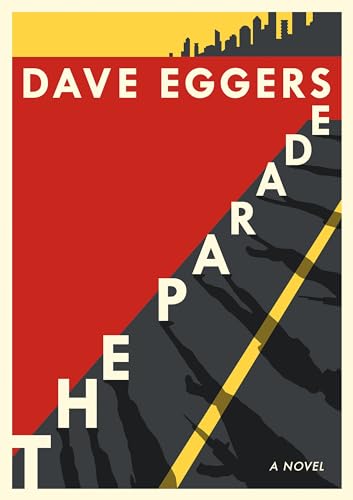Someone once said, “Life”—or was it history?—“is one damned thing after another.” Whichever it was, and whoever said it, Dave Eggers’s The Parade—or any parade, really—is just that: one thing after another. The novella’s plot moves in a straight line, event after event rolling along day by day. But The Parade can’t be reduced to its plot any more than life (individual or collective) can be reduced to bare events.
The plot: A man is paving a road through a country that has recently (apparently) ended a devastating civil war. The road, as laid out by an unnamed foreign company contracted by an unnamed foreign power to aid the unnamed country, is destined to be as flat and straight and well-made as a road can be. Its stated purpose is to unite the torn-apart country; it will heal.
The protagonist, who calls himself Four (“for reasons of security, the company insisted on simple pseudonyms, usually numerical”), is a real square, a stolid worker whose experience, over 60-plus similar assignments, dictates that going by the company book means he’ll get the job done on schedule—without getting killed.
“Work like his often took place near the time and place of violence and atrocities, without actually intersecting with either…He once missed by minutes the scene of a crucifixion.” Safety and efficiency lie, above all, in keeping aloof from the people who populate the country he’s paving.
The paving machine is built for isolation. Inside its closed cab, all its operator need do, basically, is keep rolling. The roadbed awaits, prepped with pods of fuel and material at intervals matching the machine’s capacity. Four is almost literally at one with the machine, even before he hops into the cab. The story opens with him waking with “leaden head” in “platinum light” within a CHU (Containerized Housing Unit). It’s almost as if he’s a man flying solo in a space capsule. When he bathes, his goal is to remove “his human stink.” A perfect night, for him, is a black expanse “unsullied by human striving.” Four’s helper, Nine—as in the maximum single-digit odd number, not to mention the number of lives for a cat—is the spanner in the works. (Did Eggers do the math, to yoke two numbers that add up to bad luck?) Nine has hair that flops in his face; he smiles and chats. He has a mouth Four repeatedly observes as “womanly,” not with homoerotic overtones, but with distaste; such a mouth disrupts a manly face.
Nine’s job is to scout ahead, driving a quad, to “mitigate obstacles,” which can range from a crinkle in the roadbed’s surface to a shepherd and his flock crossing in front of the paver. Rather than mitigating obstacles, though, Nine generates them. Time after time, Nine goes off the company book, drinking the local water, eating the local food, shagging the local women. In getting down with the natives, he endangers himself and Four, and puts the job at risk of missing its deadline.
Four seethes. Not only does he want to get home to his family ASAP and in one piece, but the president of the newly reunited country has scheduled a grand parade, to begin “the moment the road was completed.”
Despite repeated omens that the country’s war-scarred people hold deadly bitter grudges, Four persists in believing that the road will heal the nation, that the people will rise to exploit the manna of foreign aid, with “joy and frenetic enterprise.” Neither his dour outlook nor his relentless pragmatism shakes this optimism, based as it is in a bedrock faith in progress and order.
Nine shares his optimism, though for him it’s all about people, about being human. Four sees the road, Nine sees the people who will travel it.
The book’s setting is conveyed vividly, yet without specificity. It’s dusty; refuse is burned or left in heaps; black plastic garbage bags containing “the waste of war” litter the roadside. It’s hot and humid, and air conditioning is not a norm, except in the “cockpit” of the paver. Nine is enchanted; Four sees nothing new: “Everything around them was standard for a developing country after a war,” including “white trucks full of aid workers fretful or debauched.” Four’s admiring and detailed assessment of the paving machine, with which a single operator can pave a roadbed and even paint the double yellow line in one pass, disarms doubt that such a thing can exist (it doesn’t) and conveys a time in the near future when road paving is no longer “messy and toxic work” involving too many human beings.
Eggers is less effective with the terrain. The characters see far into the distance, even in a “rough terrain, thick with foliage and outcroppings.” Four rides shotgun on a motorcycle through “low scrub” to see a “mosaic of light visible through the woods.” Eggers might have intended to underline vagueness of place, but Four’s character, so tightly woven by Eggers, undermines the effect. Even as events unpin Four’s emotional center, a precise and widely traveled man like him would not misidentify his surroundings.
The inconsistencies in terrain distract, but overall Eggers succeeds in evoking a fractured Anyland, through which two men of opposing temperaments and views (mash them together and it’s Everyman) are tasked to pave a perfectly straight and level road. Nothing and no one have a proper name; for example, a local man who entangles himself with Four and Nine is called Medallion for wearing a “large silver medallion” whose design is never further described.
 The lack of specifics molds The Parade into an allegory that, in sideswiping Joseph Conrad’s colonial-era novella Heart of Darkness, ponders the enterprise of intervention, here exemplified by foreign aid: help framed and executed largely by people who are not native to the land of the people they are helping, with motives on all sides shadowed by less than altruistic agendas.
The lack of specifics molds The Parade into an allegory that, in sideswiping Joseph Conrad’s colonial-era novella Heart of Darkness, ponders the enterprise of intervention, here exemplified by foreign aid: help framed and executed largely by people who are not native to the land of the people they are helping, with motives on all sides shadowed by less than altruistic agendas.
Allegories don’t generally supply juicy psychological backstory, a complex plot, lush language. Even lacking such beloved elements of literary fiction, The Parade bestows in straightforward prose what only literary fiction can offer: a handful of time in which the reader can be embedded in another person, not to escape but to understand a part of our world that our own lives cannot reveal. Maybe it’s in this way that Eggers’s allegory avoids prescriptiveness; it’s plain that we’re living the allegory from one man’s perspective. Four’s acute observations of street life, as he and Nine head in a taxi to where the paver is parked, reveal as much about him as they reveal about the scene and its inhabitants, and we get a glimpse of Nine:
All around were scenes of reconstruction. On a rickety scaffolding made of gnarled sticks, a dozen masons were repairing a municipal building with a cloud-shaped hole in its facade. Next door, a middle-aged woman, wearing a fur-lined winter coat, sat under a striped beach umbrella, next to an office copier that she’d somehow wheeled out onto the roadside. A line of men and women in business attire waited to avail themselves of her services. The high-pitched whine of a diesel scooter overtook them, and Nine laughed.
“Whole clan,” he said.
Four glanced over to see that a family of five had arranged themselves on one small scooter, and soon passed them, and swung into their lane. Two of the children were standing on the runner in front of their father, whose wife clung tight to him with a baby strapped to her back. The baby, fast asleep and its face cloudy with diesel fumes, wore a stocking cap covered with jewels and bells.
This was a burgeoning city awake and alive after a civil war its residents assumed would have no end….
Eggers is a master of point of view; critic Michiko Kakutani lauded his “uncommon ability to access his characters’ emotions and channel their every mood.” You adhere to his protagonist, even if you have little or nothing (besides being human) in common with him (usually a him), and even when you’re not entirely on his side. In The Parade, Eggers needs every scrap of this mastery to pull off his ending. Be prepared to engage.
 As in Eggers’s A Hologram for a King, the protagonist of The Parade is a stranger in a strange land, where circumstances conspire to take him apart. Four is so tightly welded together that only extremes will break him, his psyche so carefully protected, you both hope and dread it will be unpeeled.
As in Eggers’s A Hologram for a King, the protagonist of The Parade is a stranger in a strange land, where circumstances conspire to take him apart. Four is so tightly welded together that only extremes will break him, his psyche so carefully protected, you both hope and dread it will be unpeeled.
One thing you know pretty much from the start (again, as in A Hologram for a King): the protagonist will fail, literally or in some other, essential way. What exactly he will lose, in failing, and what he might gain, is what you read to find out.









